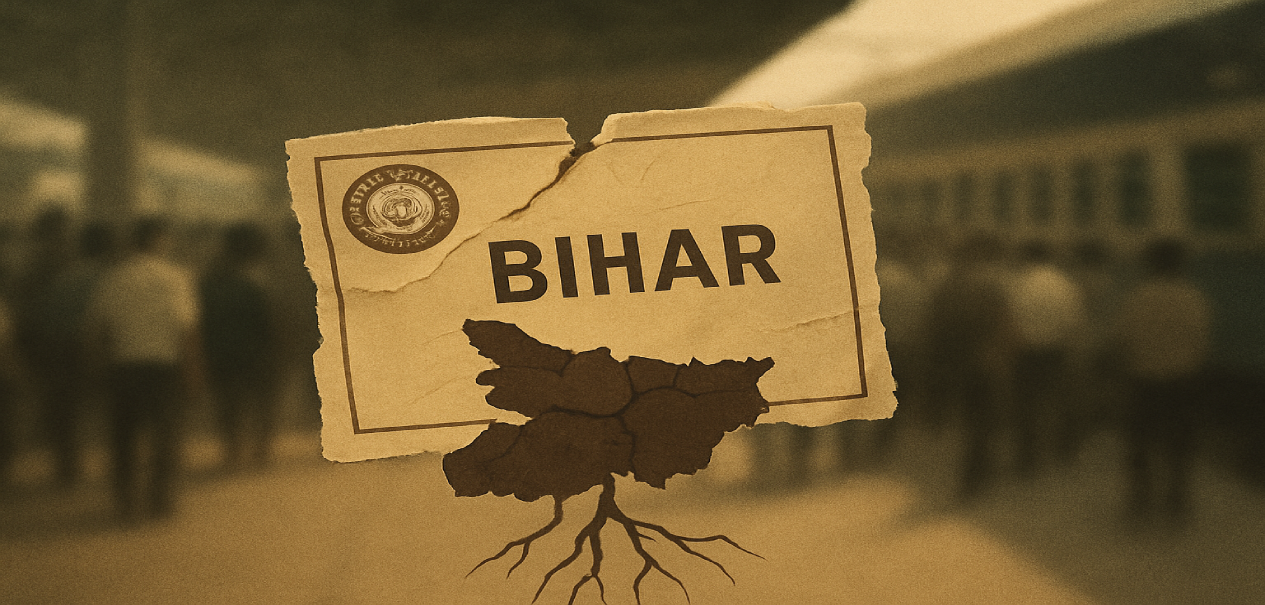This article introduces the term Anti-Biharism to designate a persistent and normalised form of regional discrimination directed at the people of Bihar across linguistic, cultural and socioeconomic domains. Drawing from lived experience and observation, the term seeks to name a system of marginalisation that has long operated in silence and satire and humour.
The Unnamed and Untheorised Prejudice
India's societal hierarchies and its imagination have long been shaped by discourses on caste, religion, language and gender. Yet, certain forms of internal hierarchy, particularly those grounded in regional stigmatisation, continue to operate in the shadows of public discourse and are neglected by academia as well as mainstream media. Among the most enduring of these is the subtle, pervasive and socially permissible hatred for the people of Bihar. This hostility, I argue, constitutes a recognisable and systemic pattern of discrimination that requires conceptual framing. I call this pattern Anti-Biharism.
Anti-Biharism is not a neologism. It is a term born out of observation, interaction and analysis. The ridicule of accents, the stereotype of criminality, the denial of rental housing, the mockery in pop culture and the genocidal tone and dehumanising slurs that operate across digital spaces. These are not isolated incidents. They form a web of patterned exclusion. The term Anti-Biharism captures the collective weight of these phenomena making visible what has thus far remained unnamed.
Conceptualising Anti-Biharism
In conceptualising Anti-Biharism, I do not rely on mimicry of global terminology. Rather, I locate it within India's own matrix of social stratification, where certain regions are percieved culturally subordinate and politically disposable. Bihar has historically been regarded as "backward" in the national development discourse. The Union Government in Delhi neglected the development of Bihar for decades. After analysing, it seems, it was a deliberate attempt so that Bihar could remain a hub for cheap labour which could be exploited by coastal rich states.1 People from Bihar particularly migrants are framed as unwanted yet essential, visible yet voiceless.
The term BIMARU which was coined by the late demographer Ashish Bose in the mid-1980s. He introduced this acronym in a paper presented to then Prime Minister Rajiv Gandhi, using it to describe the states of Bihar, Madhya Pradesh, Rajasthan, and Uttar Pradesh, which were lagging behind in economic and social development indicators. The word "BIMARU" is derived from the Hindi word for "sickly"; it is derogatory both in tone and sense, reflecting the poor performance of these states in areas such as health, education and economic growth.2 For whatever his reasons for coining the term, people began using it to mock Biharis. The reason Biharis have become a focal point is because the term BIMARU sounds somewhat similar to the state's name—Bihar. While the other states have cleverly been shielded, as Biharis were on the frontlines of receiving dehumanising slurs.
This contradiction is foundational to Anti-Biharism. It exists in the cognitive dissonance of an urban elite that depends on Bihari labour but disdains its presence. It manifests in the dual reality of political parties mobilising Bihari votes while remaining silent about their cultural and social humiliation. Even national political parties such as the BJP and its ideological parent the RSS, and the Congress have never publicly and officially condemned the discrimination that Biharis face, even though Biharis give them a majority of votes in general elections. This Anti-Biharism thrives in the meme economy of social media, where slurs and dehumanisation are couched as humour.3, 4
This Anti-Biharism does not remain confined to social media or informal spaces. It has entered our institutions as well5, particularly among the elite classes who influence and formulate public policy. One such instance is when a former Supreme Court judge Justice Markandey Katju made a comment on Facebook: "Pakistanis, let us end our dispute once and for all. We offer you Kashmir, but on the condition you also take Bihar. It is a package deal." He went further and challenged people to file a case in the Supreme Court against him.6 . This also suggests that indulging in Anti-Biharism carries no consequences and people use dehumanising slurs casually because they know there will be no repercussions.
Anti-Biharism thus emerges not as interpersonal prejudice, but as a mode of structural regionalism which produces hierarchies between citizens on the basis of birthplace, speech and perceived social worth.
The Need for a Vocabulary of Dignity
Naming Anti-Biharism is not a call for grievance politics, nor a strategy of victimhood. It is a response to the epistemic erasure of a form of marginalisation that has lacked vocabulary and recognition. Without a name, the prejudice remain diffused into "jokes," "frustration," or "cultural difference." With a name, it acquires the possibility of scrutiny and resistance.
The term also serves a pedagogical function. It enables students, researchers and journalists to identify and analyse recurring patterns of regional exclusion, instead of approaching each instance as an aberration. It invites us to build archives7, conduct ethnographies and revisit the political economy of migration through a fresh lens.
Importantly, Anti-Biharism can also serve as a template for other unrecognised forms of internal marginality and discrimination. It encourages scholars to think more critically about intra-national hierarchies that shape the everyday lives of millions.
Conceptual Integrity
If the Indian republic is to honour its commitment to equality and dignity, enshrined in the constitution and in several SC judgements, it must not only address traditional established discourses of inequality but also confront the hierarchies it has normalised internally through silence, satire and selective amnesia.





No comments yet. Be the first to comment!